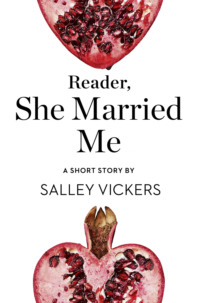
Полная версия
The Other Side of You
In spring, the quince was lit with a pale pink translucent blossom, but it wasn’t spring when Elizabeth Cruikshank and I met. That autumn the south coast was experiencing unusually foul weather. She arrived regularly and on time, lowered herself, in a way which suggested extreme fragility, into the blue brocade chair which was once my mother’s, and sat, as the wind whipped the branches of the old quince, saying nothing but staring out at the tree, which seemed to hold for her a persistent fascination.
There are different qualities to silences and in my job you learned to read them, like an old-style weatherman observing skies or an experienced fisherman reading surfaces of water for signs of imminent fish. I, for one, welcomed them. There are few jobs where you are paid to sit quietly and in the silences ideas have come to me which voluble transactions would have scared away. My patient sat wrapped in her invisible mantle to protect the wounds which had brought her to me, while I sat, a little at a distance, at a discreet angle from her, saying nothing too. There was no antagonism in her demeanour. It conveyed only a lack-lustre indifference, as if I was part of the furniture of a cell—a nun’s or prisoner’s—an unregarded bystander to her pensive preoccupation.
I have no accurate recall of the number of meetings the two of us sat like this and I became somewhat used to sitting, at my odd angle, alongside her. Her mute presence did not disturb me, other than through my growing sense of the extent of this uncharted pain.
But one day, when the weather was particularly violent, after staring a while at the tree outside, she volunteered, ‘It could blow down in that wind.’
‘Yes, it might,’ I agreed, trying to conceal any off-putting excitement.
She made no follow-up to this, so after a decent pause I hazarded, ‘Do you feel you might blow down too?’ The grey eyes grazed mine and looked away. ‘Or you mightn’t survive a storm?’
She made a gesture, as if shrugging the invisible protective mantle closer round her, but we had made some sort of contact so I pressed on.
I first met Gus Galen at the big biennial conference on anxiety and depression. He would probably be either thrown out or not taken on at all by today’s medical faculties. The son of an East End tailor, he was one of those annoying prodigies who won a scholarship to Cambridge at sixteen, read Greats, became a classics don, gave that up and trained as a medic, specialised in neurology and then found he took more interest in the impalpable than the substantive workings of the mind. By the time we met he’d had, I surmised, a fairly raffish past but there was a childlike innocence in him, which shone in his mild, slightly protuberant hazel eyes. These eyes fixed you with a guileless stare which the susceptible found hard to resist. But he also had a talent for making the kind of simple-sounding observation which permanently affects the way you think and feel.
I met him pacing the pavement outside the hotel where the conference was held and which I’d left to stretch my legs and take a breath of air. He had gone outside to smoke one of the dreadful miniature cigars that I was to learn he was never without.
‘Tell me, dear boy,’ he said (everyone was either a ‘dear girl’ or ‘dear boy’ to Gus, unless they were a ‘bitch’ or a ‘baboon’), darting over to catch my arm—he was a big man but with that nimbleness which big men, in defiance of gravity, sometimes display. ‘What did you think of Collier’s paper?’ Steve Collier was a hard-line drugs psychiatrist.
‘I thought it was pretty crude,’ I risked. For all I knew Gus was Collier’s best friend.
‘The man’s a bloody baboon,’ said Gus, and I felt I had passed some test. ‘Fancy a stroll?’
We walked down to the Thames and alongside the greygreen river, then past the Tate and on up towards the Houses of Parliament where we crossed the road to Westminster Abbey.
‘The question,’ Gus said, punching my upper arm in a gesture which I discovered was as much part of him as the disgusting little cheroots, ‘the question is not how to cure or be cured but how to live.’
It was a comment which dropped like a diamond into the well of my being where its simple brilliance never ceased to sparkle for me. The people we were treating were not so much looking for a remedy for anxiety or depression, they were looking for a reason to be alive. For the most part, the human race takes for granted that life if not a blessing is at least desirable enough to cling to. But for those for whom the business of being alive is a much more vexed question, the illness is the question, or, to put it another way, the illness is how the question may be posed.
For these hesitant souls it is life and not death that holds the terrors and if I recognised the feeling it was because I shared it. But it took Gus Galen to put it into words for me.
‘See there,’ he said, stabbing with a burly finger in the direction of the old church, as if he were about to accuse it of some serious misdemeanour, ‘that’s what places like that should be for. To help us live. There’s no cure for being alive…’
‘There’s no cure for being alive,’ I suggested into the autumnal silence to Elizabeth Cruikshank.
‘There is.’
The ginger tomcat, against which I waged war, as it used the garden as a latrine and attacked the garden birds I liked to feed, was balancing nonchalantly on the fence outside. I waited a little longer. I wanted her to say it.
‘There’s death.’
She seemed a lot further from me across the three feet or so of space between us in the room than the cat outside.
‘So you were attempting that cure? Rather a drastic one.’ I allowed the smallest trace of irony into my tone.
Again she shrugged, looking not at me but out at the rain which had begun to drizzle down on the elderly tree.
‘Not to me.’
‘Not unwelcome, maybe, but drastic nonetheless.’
Something about her made me feel that the distinction might be one she would understand, but it produced nothing. I tried a different tack. ‘I gather you’ve decided not to take any further medication while you’re with us.’
‘I prefer not.’
‘I see. Any reason? I should say I shan’t force anything on you but drugs can sometimes help.’ It was in my mind that it was drugs which had failed to help her leave life, so I could appreciate her antipathy to having them help her endure it.
‘I’d rather not.’
‘Fair enough,’ I said, deliberately brisk. ‘Let’s see how you go.’
I waited again in case she came out with anything more and the silence thickened, hovered for a moment, as if she might relegate it a second time, hung in the air between us and then attenuated and passed over. I felt there was no more to come from her but I made an appointment to see her the following day.
The principal part of the hospital was located in a modern building across the garden from the old house where I had my room. I was about to make my way over there when I heard the unmistakable voice of Lennie, our office cleaner.
Lennie was a recovered schizophrenic. I say ‘recovered’ but more accurately I should say managed. He had stayed on after being brought in for the umpteenth time from under the pier, where he hung out, madder than the vexed sea and covered with sand and pee and some or other form of the more diabolical kind of alcoholic spirit he consumed, and talking wildly to the more other-worldly ‘spirits’ who, on such occasions, invited him to demonstrate his faith in them by committing his body to the deep. I was the duty consultant that night and, I don’t know why, he took to me and I persuaded him that a regular Modecate injection might prove a sensible precaution against the spirits’ more disruptive injunctions.
Lennie took to dropping by my room, where, if I were free, he would stand and smile and I would smile back. As Gus Galen will tell you, there are important conversations which have nothing to do with speech. One day, he pointed at the window which looked out on to the quince, then transfigured by pale pink flowers, and said, ‘You see the blossom better, doc, if I was to wash the window.’ We had problems at the time getting cleaners and, with one of those brain waves which occasionally I act upon, I decided to make an advantage out of the fact that Lennie seemed to want to be useful. The inspiration paid off: Lennie took the job and was by now our longest-standing, and easily most efficient, cleaner, which arrangement allowed me to ensure that he kept up with his Modecate injections. In turn, he cleaned my office as painstakingly as if it were an emperor’s palace.
He was a bulky man, never to be seen without a yellow woolly bobble hat, which sat, jammed on his black head, atop his six-feet-plus frame, like a baby’s bonnet. He had become a popular figure around the hospital: his disposition was as benign as a baby’s and he had only one enemy, Dr Mackie, who was my enemy too.
Mackie disapproved of the informality of my association with Lennie and disliked the way I worked in general with my patients. And Lennie, as is the way with many psychotics, without any tangible information to go on, had picked this up. It was ironic, because it was drugs, more than words, or kindness, which had helped him in the end.
But now I heard Lennie’s usually deep voice risen to a squeaky pitch and hurried down the corridor to find him upbraiding Mackie who was standing in the hallway looking down at his feet.
‘You dumb fucker,’ Lennie was saying. ‘That’s my clean floor you’ve trod your fuckin’ feet over! Get your fuckin’ act together, man!’
From Mackie’s reddening face I could tell he was about to round on Lennie whose arm I now grasped, sternly saying, ‘Stow it, Lennie. Dr Mackie didn’t mean to muddy your floor. Apologise to him, please.’
I don’t know why this public schoolboy style of address came to me when dealing with Lennie, but he responded to it. He quietened down, muttered a sullen ‘Sorry, doc’, and resumed his manic mopping of the hall floor.
I walked through the grounds to the main building conversing politely, and pointlessly, with a flustered Mackie. I knew he wouldn’t easily forgive my witnessing his humiliation at the hands of my protégé.
Luckily, we met Maguire at the entrance so I had an excuse to get away.
‘Good,’ I said, ‘I wanted to catch you. Mrs Cruikshank. How d’you find her?’
‘Always the same. Quiet as a mouse. No bother.’
‘Do you like her?’
‘What’s to like? Haven’t seen enough of her yet.’
‘Well, keep me posted,’ I said. ‘You know how I rate the Maguire nose. And by the way, we can stop trying to push medication on her. She’s safe enough under your beady eye, no need to force things.’
I had to go cautiously, especially with a suicide case, though in those days we had more leeway. God knows how the poor bastards who work in the NHS cope now. But my sixth sense suggested that, her effort to escape from some intolerable anguish having failed her, my patient was less likely to try that solution a second time.
4
AFTER JONNY DIED, UP TO THE TIME WHEN I FINISHED AT university, I dreamed of him regularly, so that I now cannot swear which of my recollections are real-life memories and which remnants of the dreams. Nor can I judge how far my love of reading was a consequence of having lost my brother, but from as far back as I can recall I have always found solace in immersing myself in others’ lives, and worlds. It was therefore natural that my first degree should be in English literature. However, when I decided to go on to medical school, although I dreamed still, the dreams about Jonny seemed to stop.
I missed them—as I had missed him. But I retained the memory of them and in one, which had seemed to recur, he would say, ‘Eat this, go on!’ and on a slender silver spoon was something I expected to be Milo’s ice cream.
Milo’s was the first soft ice cream I ever tasted and it was a treat Jonny and I used to clamour for when we were out shopping with our mother on the Chiswick High Road. In those days Chiswick had a Lyons, where we ate buttered teacakes, and a draper’s shop called Goodbands, where our mother bought buttons for our shirts and thin apricot satin ribbon for her petticoat straps. And it also boasted an up-to-the-minute ice cream bar. In the dream, I would shut my eyes and open my mouth and Jonny would carefully place something on my tongue, and I knew, though I could never recapture the taste on waking, that it tasted remarkable: better than anything in life.
At the time, Olivia and I lived in a flat in one of Brighton’s Regency squares and on the days I worked at St Christopher’s I sometimes took my exercise by walking to and from the hospital. Walking home that evening, this dream came back to me. I knew it was death’s allure I had tasted from Jonny’s cold spoon and I wondered how it had tasted to Elizabeth Cruikshank.
We were due for dinner later at the home of a colleague, Denis Powell. On the whole, I tried to avoid social events during the working week, but the Powells hardly counted and nor did Dan and Barbara Buirski who were invited too.
Olivia was in the bath when I let myself in and she called out to come and find her. At forty-two she was still a pretty sight, and naked, and wet, and without make-up and in her shower cap, she looked about sixteen. I kissed her shoulder and went to pour us both a drink and came back and sat on the lavatory seat and chatted to her about her day. We hardly ever discussed mine.
Olivia and I were a mystery to me. We had next to nothing in common and there were many occasions when with good conscience I could have finished with her during our erratic courtship. In the end, I was always pulled back by something I could never quite put my finger on. It wasn’t simply sex, though sex was part of it. I seemed unable to do without her, and yet we were never a fit.
It was a puzzlement, but I knew this much: the hook was inside me, not in her. She was—well, she was Olivia. Perhaps it was that she was so unequivocally herself that drew me to her. She was substantial, she was on the side of life, especially when that life was hers.
‘No kids,’ she said, when I asked her to marry me. ‘I’ll marry you but I don’t want any brats.’
‘Fine,’ I said. Perhaps because of Jonny I wasn’t sure I wanted any either.
In fact, she did fall pregnant and, after some debate, in which I took a pretty passive position—excusing myself with the alibi that it was for the woman to make the final decision—she had an abortion. Our sex life wasn’t terrific afterwards. I suppose I thought it was the result of the termination, and assumed that eventually things would resume their previous pitch. They never did. And I never liked to enquire why. It seemed a pity, because it was one of the things which had been good between us.
But when we weren’t sniping at each other, or more often she at me, we could be affectionate and sipping my whisky I looked at her naked shoulders appreciatively in the bath.
‘Shall I soap your back?’
‘Would you, darling?’
‘It would be a pleasure,’ I said, and meant it. Olivia would have made a good artist’s model. She had a long back and it was worth soaping.
It was worth seeing her dress too and she scolded me a little, but not unpleasantly, for stopping to watch her put on her stockings. She had nice legs and good taste in shoes.
‘People will think I’m a foot fetishist,’ I complained once when she came back with yet another pair.
‘Perhaps you are. Shrinks are always cagey about their own perversions. I wonder what yours really are?’
I wondered too. Perhaps a trace of masochism. Certainly if there was any masochism at play it was not in Olivia.
I was changed and wearing my silk and wool tweed jacket long before she was ready and I waited while she did her face and sprayed herself with scent and changed her shoes a few times. She was more gregarious than me and liked dinner parties, and this evening she was in an unusually cheerful temper.
Driving to the Powells’, she remained in a friendly mood which had the effect of relaxing me. It bothered me that she was able to alter the atmosphere with one brief phrase, or word, and that in my domestic life I had fallen into a more or less permanently propitiatory position. It might have been masochism or it might have been the desire for a quiet life. The desire for a quiet life can be a dangerous ally, I’m afraid.
Chris was still in the kitchen when we arrived and Denis let us in with his usual exaggerated compliments over Olivia’s appearance. This had once worried me, for Chris’s sake, since she is one of the ugliest women I know. But she is also one of the most likeable and I had come to the conclusion that Denis was genuinely unaffected by physical charms. Or maybe he was just sensible enough to recognise that with Chris he had a gem and to hell with appearances. I admired him for this and it made me obscurely ashamed. Olivia’s glamour had an undoubted appeal, though the appeal had more to do, I think, with how I wanted to be perceived than with a more personal response. Denis’s gallantry was pure good manners: as a skilled diagnostician he recognised Olivia’s need for adoration.
The Buirskis were already drinking wine in the Powells’ untidily hospitable sitting room. Olivia was incapable of getting anywhere on time. I suspected that this was because she liked to make a conspicuous entrance but also because while she was keen on her own shoes she was not much of a one for putting herself in other people’s.
In general Olivia’s self-centredness was indulged. Dan, however, was an exception. He found my wife exasperating and didn’t conceal the fact. And this meant there was often an edginess between them which I would have to smooth down. He made a comment now as we entered the sitting room.
‘Sound the trumpets! The McBrides have graced us with their presence.’
‘Belt up, Buirski,’ I said, ‘and budge up. I want to hold hands with your wife.’
Dan got up and went to poke the fire burning in the grate, which had been ripped out during a renovation of St Christopher’s and would have been dumped for rubbish had not Chris, who had no eye for herself but a magpie’s eye for useful household treasures, rescued it. Barbara Buirski moved along the chesterfield, bought by Chris for thirty quid in an auction, patting the place beside her for me to sit down. Bar was an ex of mine, someone I took up with during one of the ‘off’ periods with Olivia. She was characteristically good-tempered when I explained that Olivia was back and Dan, when I told him, said, ‘You’re mad! Bar Blake is terrific. I’ll have her if you don’t want her.’ And so far as I could tell they’d been happy together. He was right about Bar, she was terrific, but she never got into my bloodstream the way Olivia had.
None of which prevented me from keeping up a flirtatious friendship with Bar. Dan seemed not to mind. In fact, he seemed to enjoy it. As for Olivia, I wondered sometimes if she would care if I slept with another woman. I couldn’t say as I’d not tested it, but certainly she was too secure in her own attractions to bother her head about my harmless flirting.
Bar was a dermatologist, a very able one, Denis was a consultant in geriatric psychiatry and Chris, before she had the kids, had been a midwife. So when the six of us got together the conversation was often work-centred, which meant that Olivia, as the only one of us not medically qualified, sometimes played up. She’d been PA to, and mistress of, a high-powered MP when I met her. He’d dropped her like a hot brick when the press got wind of his extra-curricular activities and rapidly returned to the arms of his plain and uncomplicated Southampton wife. I imagine it was this jolt to her self-esteem which propelled Olivia into my unembarrassed arms.
We met over a medical delegation she’d organised to the House of Commons, where I sat beside her at lunch. The button on the sleeve of my jacket got caught in the lace of her blouse. I’m deft-fingered, and I disentangled it with the occasional flamboyance which can visit me when I am not trying too hard. The episode, conducted across the table from the treacherous MP, acted as a tonic to Olivia’s wounded feelings. Looking back, I can see that her animated responses were designed to put the MP in his place, rather than to encourage me to take it. But she was attracted by my doctor’s status, and maybe, too, by my patina of cultural sophistication, though as is often the way, she liked the idea of this more than its manifestations. When we got to know each other better, and she discovered that my flash of extroversion was atypical, I suspect she was shrewd enough to recognise that this had compensations: I was unlikely either to dump her or gainsay her.
Nowadays, Olivia ran a boutique in the smarter part of Brighton. It was a waste of her intelligence but I’d long abandoned my earlier efforts to steer her career and the job seemed to suit her, mainly because much of the stock found its way on to her person.
‘Livy, that’s a fabulous frock. I’m green with envy.’ Bar, the least envious woman alive, was generous with compliments. Privately, I preferred her outfit, which was a pair of well-cut black trousers and a silk shirt. Besides being good-tempered Bar had a good behind.
‘Like it? It’s Gina Frattini.’ Olivia pirouetted, showing off the dress’s elaborately ruffled skirt.
‘I haven’t a clue who Gina Frattini is,’ said Chris, coming out of the kitchen in a pair of filthy trousers, ‘but she’s obviously posh. I’m afraid I’m as you see me, covered in dog hair as usual.’ The Powells had four children and three rowdy dogs. It was debatable which they spoiled more.
‘You’ve worried Dr McB about his trousers now!’ Dan had observed me covertly brushing at them. It was a subject for badinage among the assembled company that I’m fussy about such things.
The dogs had been shut in the kitchen, but after a good deal of barking they were let out, until Cassius, an excitable Labrador, leapt at Olivia’s dress and threatened to rip it, so, to my relief, they were banished again.
Dan, who showed an easy disregard for his clothes but disliked pets, remarked that ‘Olivia’s narcissism’ had ‘its uses’, which I was afraid might lead to one of their scratchy dialogues. I could see Olivia had gone the pink of her dress and fearing she was preparing a retort I lobbed a comment at Dan as a diversion. ‘I saw someone unusual today at Kit’s.’
‘Man or woman?’ asked Dan, who could be readily distracted by an interesting case.
‘Woman. A suicide but not one of your run-of-the-mill sort.’
‘Darling,’ said Olivia, ‘you sound so blasé, poor creatures.’ She hadn’t a grain of true sympathy for anyone misguided enough to land up in a psychiatric hospital.
‘Method?’ asked Dan. ‘D’you mind if I smoke, Chris?’ Dan, who never ate much at the best of times, had left half his first course untouched. Chris wasn’t the greatest cook, but sometimes I wished he would try harder.
‘I mind,’ interjected Denis.
‘That’s why I asked Chris and not you,’ said Dan, lighting up. ‘This is an inter-course break.’ He always made that joke and I was surprised to hear Olivia laugh. We had all long ago given up laughing at it.
‘She seems to have acquired some Soneryl from somewhere, so either she’s a darned poor sleeper or she’s clever.’
‘Darling, no one says “darned” any more,’ said Olivia.
‘Insomniacs are often clever,’ Denis interposed swiftly. ‘There’s nothing to say insomnia addles the wits. Mostly the sign of the sharp ones, in my experience. If you must smoke, Daniel, use an ashtray.’ He removed the plate on to which Dan had been flicking his cigarette and fetched a Stella Artois ashtray, which one of their kids must have taken from the pub.
‘Well, no, I mean, she must have talked someone into giving them to her with a view to bumping herself off. Soneryl’s a barbiturate. Not easy to get,’ I explained for Olivia’s sake. She couldn’t have cared less but I always felt this need to include her in these conversations.







